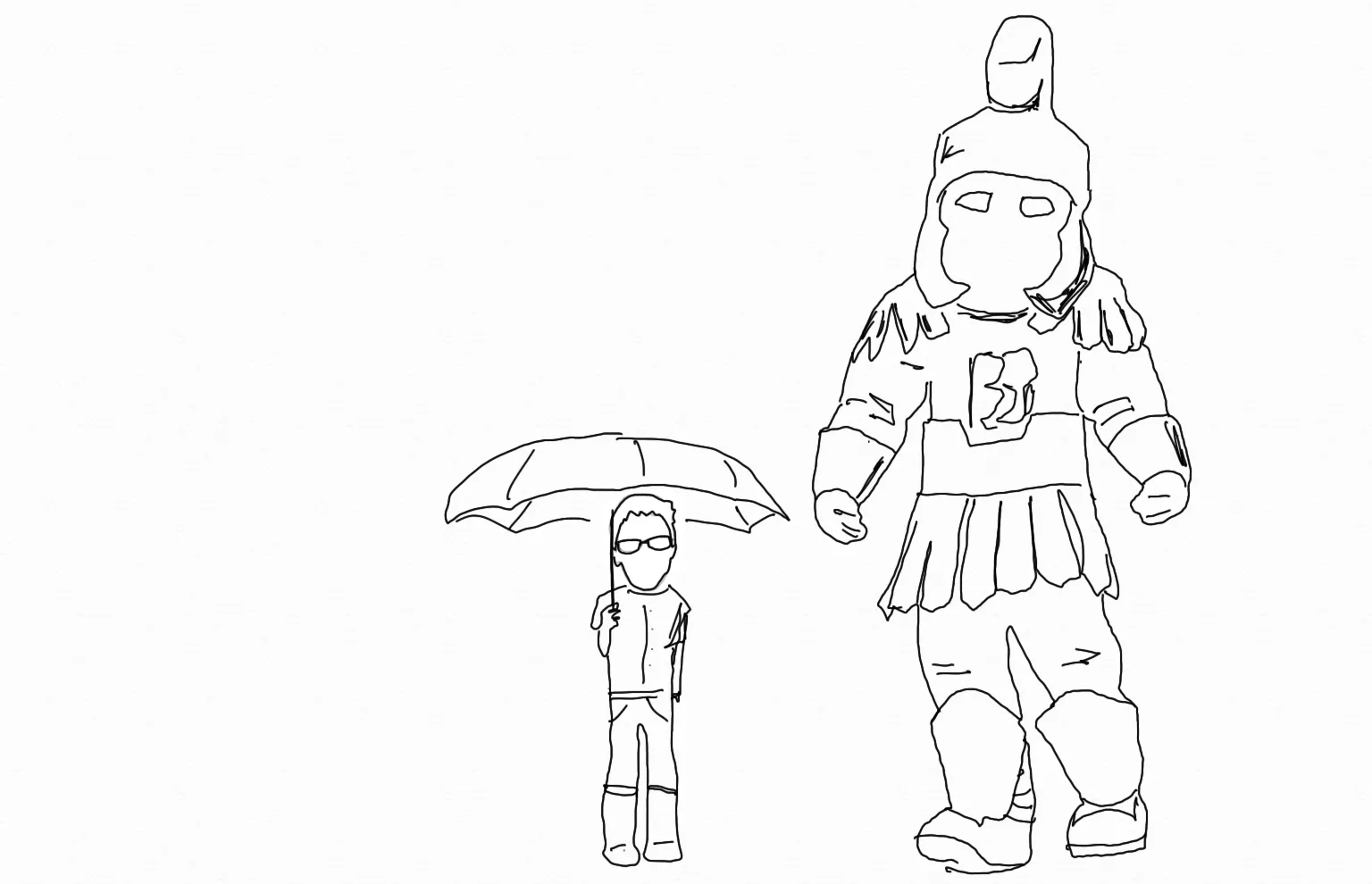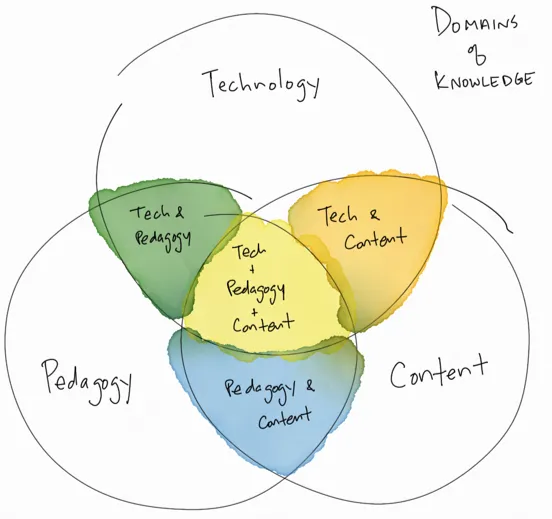My Friend MAET
Published: 2023-07-21 10:32 PM
Category: Grad | Tags: synthesis, comprehensive, retrospective, reflection
This degree has taken me a long time. I started in 2014 and thought I would get it finished right away. Life changes brought that to a stop, which included transferring out of the program and into another degree track with Ball State University. After two semesters, my work was put on hold again, and I wasn't sure I would ever finish a degree. Now, 10 years later, I'm finally reflecting on my learning and growth over my graduate work as a whole.
When people ask me what I'm studying, I struggle to answer. The Master of Arts in Education Technology (MAET) program at Michigan State University (MSU) is certainly focused on technology - every course touched on learning technologies in one way or another. But each course also went far beyond what its name suggests. In my time with the MAET program, I've explored not only the technologies of learning in various contexts, but the dispositions and competing forces - in both the public and private sectors - which influence the education technology landscape. The rigor of the MAET program helped me learn how to find, assimilate, and then synthesize ideas rooted in academic research as I work to apply technology-enhanced pedagogies in the classroom. Through completing my degree, I am able to articulate my own ideas about education rooted in evidence and then, more importantly, translate those ideas into practice with students and colleagues.

Foundations
All learning begins with a solid foundation. CEP 811, Adapting Innovative Technology to Education, was my first course since finishing my undergraduate degree. I was immediately introduced to the Technology, Pedagogy, and Content Knowledge (TPACK) framework which fundamentally altered the way I thought about technology in education. Prior to beginning my master's degree, technology was an add-on - something included in the lesson to solve a specific problem or provide a specific resource. I hadn't considered the impact that technology had on my pedagogy besides the fact that I was comfortable using it and could throw it into a given lesson without too much stress.
In CEP 811, I was asked to consider education technology (edtech) from a critical lens as it impacted other aspects of teaching. I had to come to grips with the fact that my technology domain was bloated when compared to pedagogy and content knowledge. At the time, I wasn't in a classroom, so I didn't have much of an opportunity to balance out my own skills. Awareness of this imbalance in myself was an eye-opening experience because it was one of the first times I'd confronted a clear area of improvement in my work and thinking about the work.

Beyond the coursework, the TPACK framework has played a major role in my career with teachers from a professional development and leadership perspective. TPACK provides a solid starting point for reflecting on teaching and how we make decisions. When I introduced the framework to colleagues in professional learning sessions, it helped facilitate a safe space to talk about self-improvement because teachers were able to identify specific domains of skill they already had and which ones they wanted to develop more. Even now, I refer to TPACK as a tool for staff development and it is a tool I continue to use as I reflect on my own work.
Leadership
Of all my coursework, I think about CEP 815, Technology and Leadership, the most. Dr. Rosenberg and Dr. Gleason created a course where leadership as it related to education technology was the focus instead of exploring the technology of leadership. We were pushed to identify our own leadership tendencies and then wrestle with the implications in our daily work. Dr. Gleason and Dr. Rosenberg used situation learning, role play, and case studies from outside the world of education to help us discover our own leadership potential and prepare a system of working in our own spheres of influence as leaders.
In 815, I was challenged by the high expectations for crafting arguments in writing. At times, I struggled to connect my thesis with the proposed solution. Dr. Gleason modeled effective, actionable feedback which helped me in scholarship, writing, and in communicating and executing ideas based on research. CEP 815 taught me to take a step back and consider the landscape before diving in. In my current role, I am primarily responsible for identifying opportunities for teacher growth and then creating and carrying out plans within the district vision. As a leader, it is critical that we consider the goals of the organization over our own aspirations, but the two do not have to be exclusive.
Given the rise of teacher-leaders in schools, it became clear how important home-grown leadership is for schools. Teachers carry a great deal of capacity for leading change and by building strong relationships between instructional and administrative staff, schools can build resiliency for change to meet challenges. I hope to continue to grow as a leader in different contexts as opportunities come along.
Deeper learning
During my student teaching, one of the first lessons my mentor taught me was the value in reflection. Since then, reflection is a normal part of my work and it has helped me develop a healthy balance of self-criticism and a drive to improve. CEP 800, Learning in School and Other Settings, asked me to consider what learning is as a process. I was surprised to realize that I'd only ever wrestled with the process of learning from a cognitive perspective; I was aware that learning had social influences, but had not taken time to consider what learning looks like as a developmental act.
Prior to CEP 800, my tendency was to focus on learning as a process of information processing from the individual perspective. However, learning as a result of relationship, whether in schools or somewhere else, is just as important to the cognitive processes, if not more. We are primed to learn from birth but the true power in learning isn't appreciated until we begin to learn together. "The smartest person in the room is the people in the room" felt more and more real to me as I explored and recognized social learning constructs I hadn't considered fully before.
My theory of learning as the final product of the course is the result of the wide range of topics from early cognitive science to modern social learning theory. This piece is my attempt to combine my years of experience in the classroom with research to serve as an evidence-based guiding document which details my own thinking about how and where learning happens. The implications for my instruction are embedded in the text as I related cognitive and social science to classroom practice. This is one of the items I'll revisit periodically as I continue to reflect on my professional practice.
Academics balanced with practice
Beyond the course content, my degree has taught me how to thoughtfully approach knowledge building. Taking academic writing and carefully reading over findings to build understanding is a skill that the MAET program teaches well. I feel like I am frequently walking the line between academics and academia: I am involved in the business of helping students learn and academia has insight and value in practice. But there is a danger for the practitioner in how much stock is placed in the process of research and writing opinions and commentary.
MAET had its share of academic reading and writing, but it was always through the lens of practice in the classroom. I never felt like I had to read and respond to a prompt as simply an exercise in discourse. My work in MAET courses was focused on classroom application, and I was challenged to synthesize ideas rooted in academic literature, lived examples, and my professional experience. All of my MAET courses stretched my thinking into different areas of practice and through well-designed prompts and consistent instructor feedback, I was able to assimilate ideas clearly both in writing and in action.
Participating in a graduate program requires a full commitment to the habits and practices of the academic community. In the middle of the semester, my thinking is dominated by jargon and it bled over into my work with teachers. The hardest part for me was to incorporate academics with practice in a way that would not alienate someone unfamiliar with the language of education theory. My place is in the classroom with students and my time in the MAET program equipped me with skills to not only continue to seek out ideas through scholarship but to also make those ideas approachable by colleagues and students as we work together in schools.
Enduring understanding
A mentor always challenges me to consider the "knowledge, skills, and dispositions" I want students to have as a result of taking my classes. The underlying idea for each of those is enduring understanding: what will they remember because they had me as a teacher? Some if it will be content - a few of my students have gone on into higher education and careers as scientists and that is part of my legacy as an educator. However, for the vast majority, that is not the next step. As a teacher, I am far more interested in how I help students develop life skills and positive dispositions toward themselves and others.
I am undoubtedly a better teacher because of my graduate work. I've been exposed to ideas I wouldn't have otherwise been asked to consider and incorporated leadership principles, technology philosophy, and instructional frameworks into my routines. I am able to clearly articulate my reasoning in speech and in writing and I can make rational, concise arguments when warranted.
The MAET program has helped me build my own knowledge in a variety of topics. There are several examples with the ones previously mentioned which stand out and have made me a better teacher. But like with my students, my enduring understandings are much more pronounced in the skills I've developed in research, interpretation, and application of ideas. I'm more aware of the larger education research world and how it can bring benefit to classroom teachers. I've developed a desire to want to follow threads of intuition and to confirm or deny those feelings with evidence whenever possible.
The best part about completing this graduate course is being able to look at the last 10 years of my education career and see a marked difference in my dispositions then when compared to my dispositions now. This process has been challenging, encouraging, frustrating, and rewarding (sometimes all at once). My hope, as I look forward, is to be able to continue to foster my curiosities and put my skills to work to build strong communities of learning
All artwork in this piece was drawn by me, digitally.

Comments